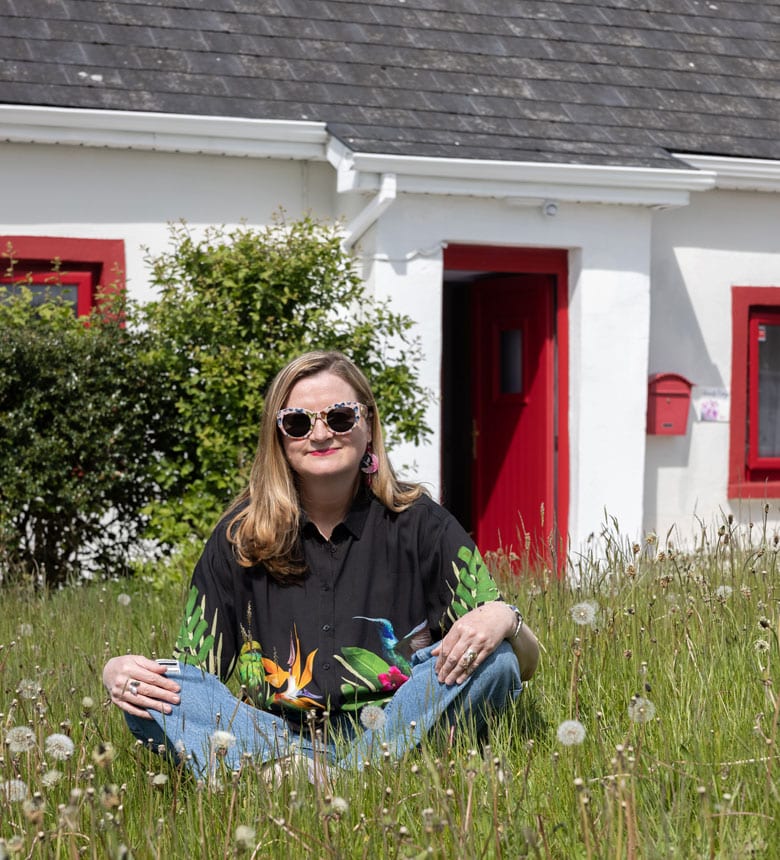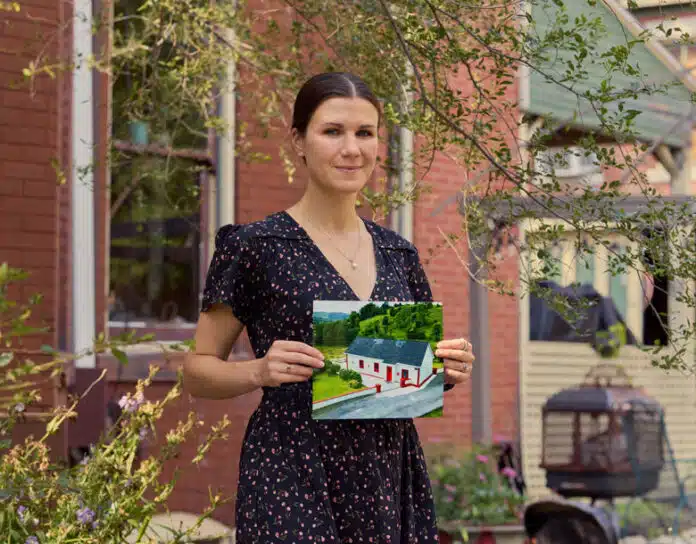Kathleen Spangler has had a busy year.
Last October, Spangler, a 29-year-old U.S. Marine Corps officer, applied for her Irish citizenship through lineage on her father’s side. It was approved a month later — fast-tracked because she was pregnant. In February, she, her husband Michael Spangler — 30, also a Marine officer — and their two toddlers transferred from their duty station in North Carolina to Dayton, Ohio. Three weeks later, Spangler gave birth to their third child. The couple started preparing for graduate studies in engineering.
Amid all these life-changing events, she only vaguely remembered buying a few tickets in an online raffle back in December.
With her new citizenship, she had been browsing Irish real estate sites on Instagram when she saw a post announcing the chance to win a house on 1.75 acres in County Leitrim, a pastoral corner of northwest Ireland. Tickets cost 5 British pounds apiece, and the site was promoting a buy-two-get-one-free offer. On a whim, Spangler entered, paying $12.67 for three tickets.
“And then I completely forgot about it,” she said. “Nobody enters these things really thinking that they’re going to win. At least, I don’t. But there’s always a chance, and that’s the fun part.”
Six months later, on May 22, she got a text from a friend asking, “By chance, did you win a cottage in Ireland?”
“And I said, ‘I don’t think so, but let me check,’” Spangler said.

Her friend had just read an article about Imelda Collins, the Irish woman who was hosting the raffle with the goal of offloading her two-bedroom cottage and moving to Italy. But by the time she decided to enter herself, the contest had closed and a winner had been announced by Raffall, the British company sponsoring it. It was Kathleen Spangler.
Spangler didn’t believe it. She sent a text to her husband, who was in class, as a question more than a declaration: “I think I just won a house in Ireland?”
“My wife doesn’t even gamble,” Michael Spangler said, “so that was a surprising text to get in the middle of a math course.”
She told him more about the contest; he thought it was a scam. What were the chances that she had won a worldwide raffle competition based in Britain with just three tickets? But when she received an email from Raffall, and then from Collins herself, Spangler realized it had actually happened.
“Imelda’s first email mentioned how I must be in shock, but she’s excited for me,” she recalled. They spoke a few hours later on WhatsApp. “It was a great experience to be able to speak directly to her, and helped to make things real.”
Moving to Ireland would be something of a homecoming: Spangler’s grandmother emigrated from County Mayo, in northwest Ireland, and her great-grandfather’s family hailed from Sligo, a town about 12 miles from the house. Collins, 52, was thrilled to hear that she had roots in the area. “I truly feel my home was meant to be hers,” she said.
With a newborn, a new home and a new academic venture, the Spanglers are now beginning to sort out how and when they’ll take possession of the house, from the legal red tape to the tax implications.
“My husband and I have talked about someday, when we are out of the military, getting property overseas and splitting time between the United States,” she said. “But that was obviously a future goal.”
Fortunately, they have some time. Property transfers in Ireland typically take around three months to complete, said Stelios Kounou, Raffall’s CEO. The company acts as a go-between for hosts transferring their goods — which range from sports tickets to cars to homes — to the winners. In this case, Raffall will supply the legal team to oversee the due diligence for the company and for Collins. As part of her contest offer, Collins will pay for Spangler’s attorney and the Irish stamp duty on the transaction.
Kounou said that Raffall’s solicitors have begun the paperwork in Britain.
“The contracts are handled by the lawyers much like a traditional property sale,” he said. “The key difference is that, since the property was won rather than purchased, the winner doesn’t have the same rights as a buyer — similar to how it works at auction. Once both parties are happy with the terms, the transfer of ownership and release of funds take place simultaneously, all managed by the lawyers.”
For Collins, who decided to raffle her house after reading about another Irishwoman who had raffled her Dublin apartment, the closing of the contest brings a huge sense of relief. When she launched her raffle in October, she set a goal of selling 150,000 tickets via Raffall. At 5 British pounds apiece, that would come to 750,000 pounds, or about $1 million. Not bad for a house she bought for about $150,000 in 2022.
She monitored her ticket sales every day, spending nearly 25,000 euros (about $29,000) out of pocket for advertising and marketing. “I accepted that I probably wasn’t going to succeed, but I am an optimist and was going to remain hopeful until the very last minute,” she said.
If she fell short of 150,000 tickets, as per Raffall’s terms, she could give the winner 50% of the revenue and keep 40% and the house, or give the house away and keep more of the revenue for herself. Up until a few days before the May 20 drawing, she was unsure she’d meet her goal.
But in the end, Collins said, 206,815 tickets were sold, grossing 1,034,705 pounds (about $1.4 million). Besides the 10% to Raffall, she has about 2,600 euros to pay in affiliate fees, plus a 33% capital gains tax, 1% of the value of the house for stamp duty, and fees for her lawyers and the Spanglers’ lawyers.
“There are days I am still in disbelief that it happened and it actually happened to me,” Collins said. “I don’t want to say I believe in miracles, but I always try and give it a go to see what happens. I’m over the moon.”
She and Spangler anticipate meeting at some point for the handing over of keys. While they wait for instruction from the attorneys, Collins is sure of one thing: “There will be a big deal when the keys actually get transferred. I will make it very special.”
She’s now starting to plan her next phase — a move to Italy, where she can resume teaching English. But the experience may have opened another door. “I might like to do something with social media,” Collins said. “I thought I wasn’t going to be able to do it, honestly, but I managed, so I’m thinking strongly about a career in marketing.”
She has received messages from people asking for advice about marketing their own houses via a raffle like she did. “I’m not saying that I have a flair for it,” she said, “but I went from knowing nothing and thinking that my campaign was doomed to learning a lot.”
c.2025 The New York Times Company. This article originally appeared in The New York Times.







